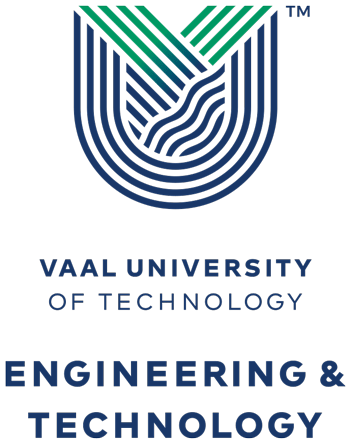Industrial Engineering, Operations Management & Mechanical Engineering
The Department of Industrial Engineering, Operations Management, and Mechanical Engineering (IEOMME) at VUT offers three complementary study areas that equip students with versatile skills for various industries.
About Us
Department of Industrial Engineering, Operations Management & Mechanical Engineering
Staff
Meet the talented individuals at VUT who drive our success with their expertise and passion
Contact Us
Have questions or need assistance? We’re here to help!
Alumni
Have questions or need assistance? We’re here to help!
Department of Industrial Engineering, Operations Management & Mechanical Engineering

Head of Department
Prof George Mathews Ochieng’
Areas of expertise
Water Resources Engineering & Modelling, Hydraulics, & Geotechnical Engineering
Areas of interest
GIS Application in Water Engineering, Water Resources Planning & Management, & Climate Action
The IEOMME department offers three distinct study areas that are highly complementary to each other. These areas are extremely useful in various industry scenarios and can help students gain valuable knowledge and skills that can be applied in real-world situations. The first area of study is Mechanical Engineering, which is a field of engineering that has been around for a long time. Mechanical Engineering involves the design, development, and maintenance of mechanical systems, machines, and devices. This field is highly important in manufacturing, transportation, energy production, and many other industries. Mechanical engineers are responsible for creating innovative systems, processes, and machines that make our lives easier and more efficient.
The second area of study is Industrial Engineering, which emerged from Mechanical Engineering when the industry realized that the innovative systems, processes, and machines created by mechanical engineers required the design, improvement, and installation of integrated systems that involve people, materials, equipment, and energy. Industrial Engineers are responsible for optimizing complex systems and processes by using their knowledge of mathematics, science, and engineering principles. They work to improve efficiency, productivity, and safety in various industries, including manufacturing, healthcare, and logistics. The third area of study is Operations Management, which developed when it became evident that people with specific knowledge are required to plan, organize, and supervise production processes to achieve efficiency and customer satisfaction. Operations Managers are responsible for overseeing the entire production process, from raw materials to finished products. They are responsible for ensuring that the production process runs smoothly, efficiently, and effectively. They work closely with other departments to ensure that customer demands are met, and that production goals are achieved.
Overall, these three study areas are highly complementary to each other and provide students with valuable knowledge and skills that can be applied in various industry scenarios. By choosing one of these study areas, students can gain a competitive edge in their careers and make a significant impact on the industry they choose to pursue. The Department strives towards developing world class, innovative leaders in all the programmes on offer. We value academic excellence, quality service, responsibility and accountability, adaptability, equity, respect and integrity. Students graduate with their first qualification with us, and they can further their vertical qualifications with us as well. Some choose to do their postgraduate qualifications with other institutions, but they always come back to thank the department for the strong foundation they received at VUT.

Industrial Engineering
Industrial engineering involves designing, improving, and installing integrated systems that involve people, materials, information, equipment, and energy. It requires specialized knowledge and skills in the mathematical, physical, and social sciences, as well as engineering analysis and design principles and methods. The main objective of this discipline is to specify, predict, and evaluate the results of these systems, and to constantly improve methods, procedures, and practices within an organisation to increase productivity and profits. Value is added if inputs like manpower, materials, machinery, and money are converted more effectively into products and services by using sound management principles. An Industrial Engineer is continually engaged in core aspects such as communication, cooperation, quality, planning and scheduling, as well as the calculation of cycle time, capacity, and utilisation. Industrial Engineers should also be competent in economic analysis, problem-solving, materials handling, facility layout etc. Industrial Engineering, therefore, requires people who like working with people, who enjoy analysing and solving problems, developing solutions, gaining co-operation, and motivating people. Industrial engineers always seek better, quicker, and cheaper ways of doing things.
Career Opportunities
There is a great need for persons who are well trained in Industrial Engineering. Job opportunities as business advisors, industrial analysts, production personnel, planning personnel and line managers are available in all types of manufacturing companies as well as in service organizations. Experience has shown that people with a qualification in Industrial Engineering and a dynamic personality quickly progress to the management level or start their own businesses.
Operations Management
If you are a person who likes working with people, who enjoy analyzing and solving problems, developing solutions, gaining co-operation, motivating people and who always seeks better, quicker, and cheaper ways of doing things, then this is the programme for you. Qualified people in Operations Management are employed by both manufacturing companies as well as service organizations. In Operations Management, you will specialize in production scheduling, material movement, inventory control, quality management, work simplification, productivity improvement and will contribute to the design and implementation of integrated systems comprising capital, plant, manpower and raw materials. Your objective will be to constantly improve methods, procedures, and practices within an organization to increase productivity and profits. A diploma will be issued on the completion of five semesters of theoretical learning and one semester of Operations Management Practice (Project-based).
Career Opportunities
Operations Management offers a challenging and exciting career in the private sector. The expertise and skills that you will achieve find their optimum application and growth in the manufacturing industry, progressively, as Production Assistant / Production Planner, Production Scheduler / Head Planner, Production Superintendent, Production Manager and Operations Management. People with Operations Management qualifications and experience are also well equipped to start their own business.
Mechanical Engineering
Mechanical Engineering is the branch of engineering that deals with the design, manufacture, and operations of mechanical systems and devices. Mechanical engineering studies include the application of principles such as physics, mathematics, and material science to solve problems and create products for various industries. Mechanical Engineering is a very divers and versatile field that touches virtually every aspect of modern live. Mechanical engineers professionals are equipped with both creative and innovative skills and can use their technical and entrepreneurial skills to meet current and future societal needs. In this digital era, these graduates are well-prepared for the challenges of the industry. The activities in Mechanical Engineering can be grouped into design, maintenance, electromechanical and project work where the latter includes aspects such as planning of projects, cost control, evaluation of tenders, negotiations with contractors, control over the progress of the project, co- ordination of all the interested departments and commissioning of the completed project.
Career Opportunities
Graduates in Mechanical Engineering can work in any heavy or light manufacturing industry, e.g. the chemical industry, iron and steel manufacturing industry, mining industry, power stations, transport services, provisional and government services, etc. Technicians are much sought after and a career in this field is lucrative and rewarding.
